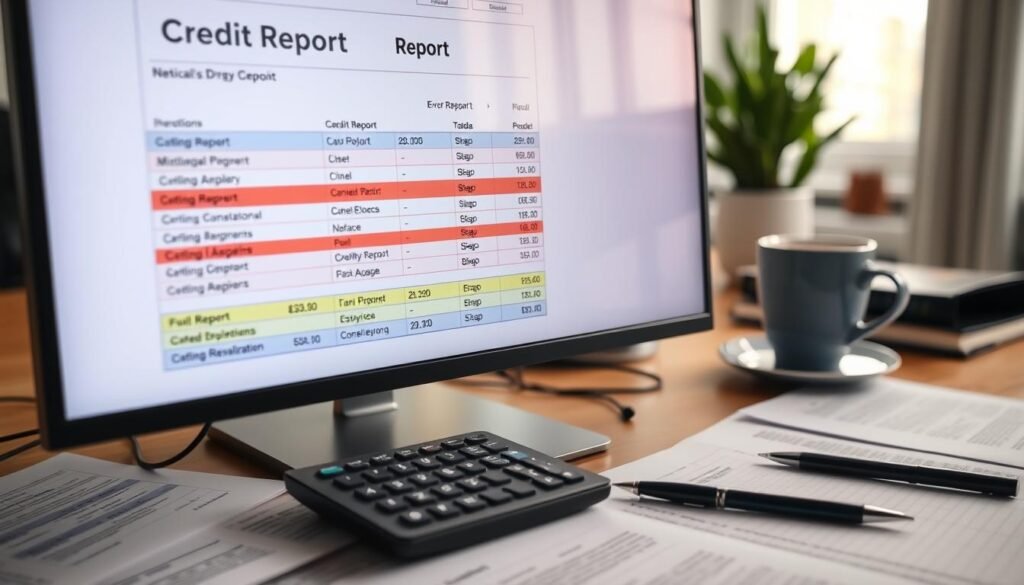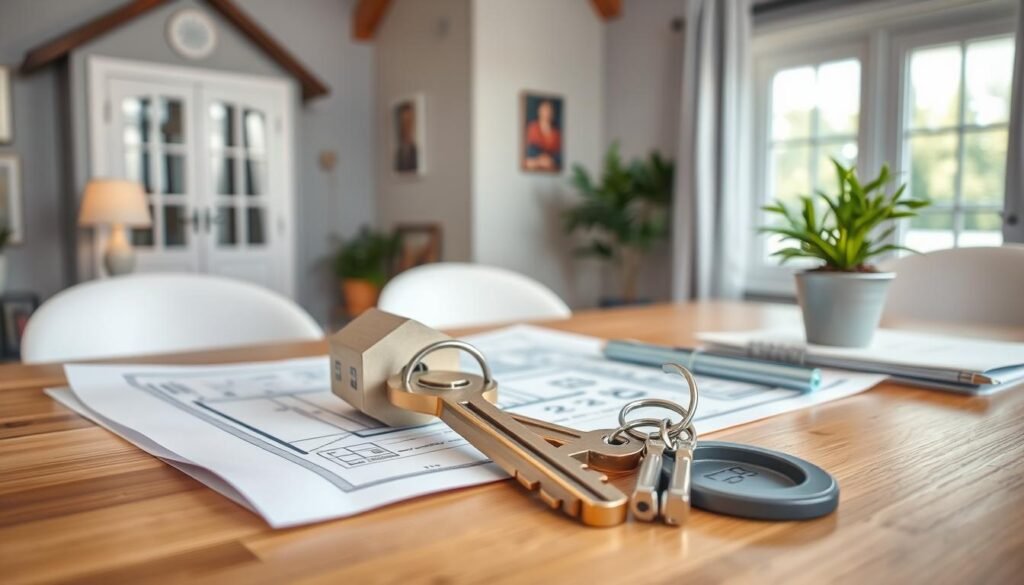This post may contain affiliate links, which means I may earn a commission if you purchase through these links at no extra cost to you
Did you know that a strong credit score could save you money on a home loan? If entering the housing market is on your mind, learning to improve your credit score is important. Getting a mortgage is more than luck—it’s about managing your finances wisely. Just a few extra points on your credit report can mean the difference between getting your dream home or missing out.
Boosting your credit score is a smart move to get a good interest rate and reach your homeownership goals. A higher FICO score means not only better mortgage eligibility. It also brings financial freedom in your new home through better loan offers and more lender options.
Table of Contents
ToggleUnderstanding Your Credit Score
Your FICO credit score is a key number for banks and other lenders. It helps them decide if you’re a good bet for a loan. Knowing your score and its workings can get you better loan deals. This might include lower rates for a mortgage. This score comes from your credit history. It tells lenders how risky it is to give you money.
In 2023, the average FICO® Score in the U.S. was 715. This score means you have a good credit history. It makes big financial steps, like buying a house, within reach.
The Impact of a FICO Score on Mortgage Rates
Your FICO credit score greatly affects your mortgage rates. Higher scores often lead to lower interest rates. This can save you a lot of money over time. A score between 670 and 739 is considered good. Getting your score even higher could lower your rates more.
Breaking Down Credit Scoring Elements
FICO scores range from 300 to 850. They consider several factors:
- Payment History: This is 35% of your FICO score. Lenders like to see you pay on time.
- Amounts Owed: This accounts for 30% of your score. It shows how much credit you’re using out of what you have.
- Length of Credit History: This is 15% of your score. A longer history is better. It gives more info on how you handle money.
- Credit Mix: This is 10% of the score. It shows if you manage different credit types well.
- New Credit: Also 10%, high numbers here might mean financial trouble.
Understanding these factors can improve your financial habits. This is very important for big moments, like buying a house. Always work on bettering your credit to maybe get lower mortgage rates.
Steps to Check and Correct Your Credit Report
Understanding your credit report is key when you’re looking to make big financial moves, like buying a home. You can get a free credit report every year from each main credit bureau through AnnualCreditReport.com. This service is backed by the Fair Credit Reporting Act (FCRA).
Accessing Free Annual Credit Reports
To start improving your credit, visit AnnualCreditReport.com. This official site lets you get a free report every year from the three key bureaus: Equifax, Experian, and TransUnion. Checking your report regularly helps you find errors or suspicious activities early.
Identifying and Disputing Errors
After getting your report, check it carefully for any mistakes. These can hurt your credit score. Common errors include wrong late payments, outdated info, or accounts that aren’t yours.
If you find errors, challenge them immediately. The credit bureaus have 30 days to check and fix your dispute, under FCRA. This can help make your financial record more accurate.
Contact the credit bureau and the data provider if you find mistakes. Keep records of all communications. This helps ensure everyone corrects the errors. Fixing errors can boost your credit score and keep your financial history accurate.

| Credit Score Factor | Impact on Score | Common Errors |
|---|---|---|
| Payment History | 35% | Misreported late payments |
| Amounts Owed | 30% | Incorrect balances |
| Length of Credit History | 15% | Outdated or wrong open dates |
| New Credit | 10% | Unauthorized credit inquiries |
| Credit Mix | 10% | Incorrect account types reported |
Keeping a good credit score means staying on top of your financial actions. It ensures fairness in your report. This can help you get better mortgage rates and protect your financial identity.
Best Practices for Timely Bill Payments
Having a good debt payment history is key for your financial health. It’s very important when you’re working on improving your credit score. Since 35% of your FICO score depends on it, paying bills on time is essential. To handle your payments well and avoid high interest rates, follow these tips. They can also help you get better loan terms.
- Set up automatic payments for recurring bills to skip late payments.
- Watch your statements for errors or unexpected charges.
- Mark due dates with calendar reminders or alerts.
- Regularly check your budget to cover payments easily.
Automatic payments make sure you’re never late on a bill. Your bank automatically pays your bills before they’re due. This helps keep your debt payment history excellent. Plus, it’s easier than paying each bill by hand.

For credit score improvement, avoiding late payments is crucial. Even small mistakes can hurt your score a lot. The table below shows how important it is to keep a good payment history for a better credit score.
| Payment Importance | Impact on Credit Score | Term of Credit Score Effect |
|---|---|---|
| Debt Payment History | 35% of Credit Score | Indefinite, until fixed |
| Credit Utilization | 30% of Credit Score | Shows right after update |
| Regular Payment | Gradually raises score | Benefits last a long time |
Timely payments and smart credit use are key. They prepare you for big financial steps, like getting a mortgage or making large purchases. Remembering these best practices will guide you to more financial success and confidence.
Strategies to Reduce Your Credit Utilization
Improving your credit score means managing how much credit you use. It’s compared to how much credit you have. Keeping this ratio low is crucial for a good credit score. It influences your chances of getting loans with good terms. Let’s dive into how to manage and lower your debt and credit card balances.
Understanding the Importance of Credit Ratios
Your credit utilization is the credit you’re using versus what’s available. It should stay below 30%. If it’s high, lenders may see you as dependent on credit. This makes you seem riskier and can affect loan approvals and interest rates. Keeping your credit utilization low boosts your score and financial health.
Paying Down Debt vs. Increasing Credit Limits
To better your credit utilization, lower your credit card balances or increase your limits. Lowering your debt directly reduces utilization, enhancing your score. Alternatively, a higher credit limit can help, if your spending doesn’t go up. Both strategies improve your financial situation and debt-to-credit ratio.
Using both strategies together works best. Start by tackling cards with the highest interest. This cuts down your charges. If you’re financially better than when you got your card, ask for a higher limit. If you don’t up your spending, this will lower your credit utilization quickly.
Let’s break down how managing credit utilization works with an example:
| Scenario | Credit Limit | Credit Card Balance | Utilization Rate |
|---|---|---|---|
| Before Paydown | $5,000 | $2,500 | 50% |
| After Paydown | $5,000 | $1,250 | 25% |
| After Credit Limit Increase | $7,500 | $2,500 | 33% |
The table shows how paying down balances and raising your limit lowers utilization. This boosts your credit score. Keep your spending in check, maintain low balances and review your credit limits. Doing this keeps your debt-to-credit ratio favorable.
Through these strategies, you’re set to not just lower your utilization but also raise your score. This improves your financial health. It makes getting better loan terms in the future more likely.
Improve Credit Score for Buying a Home by Managing Debt
When you plan to buy a house, it’s key to know and manage your credit. Good debt management is important for a good mortgage deal. This means enhancing your credit profile for lenders.
Minimizing New Credit Inquiries
It might be tempting to make new credit inquiries. But, each inquiry can lower your credit score a bit. Lenders see many inquiries as a sign of risk. So, try to keep new credit inquiries low, especially 6 to 12 months before applying for a mortgage. This helps keep your score up and shows you’re financially stable.
Maintaining Older Credit Lines
Old credit accounts help because they show you have a long credit history. This history makes up 15% of your FICO Score. Keep these accounts open and in good shape to boost your score. It shows lenders a long history of reliable credit use.
The Balance Transfer Consideration to Lower Utilization
Using balance transfers smartly can help manage your credit utilization. This greatly affects your score. Moving a balance to a card with lower interest, like U.S. Bank Visa® Platinum or Citi Simplicity® Card, cuts interest costs. It also spreads out your credit use better. Just avoid opening too many new accounts, as this could lower your score.
As you aim for homeownership, keep a strong focus on your credit score. Adjust your financial habits as needed. For more help, check out my post on debt management.
| Credit Score Range | Rating |
|---|---|
| 850 – 781 | Excellent |
| 780 – 720 | Very Good |
| 719 – 658 | Good |
| 657 – 601 | Fair |
| 600 – 300 | Poor |
Remember, every credit decision, from credit inquiries to balance transfers, affects your financial future. Making wise choices now makes getting a mortgage easier later.
Final Thoughts
Getting ready to own a home means getting your mortgage preparation and credit score optimization right. Having a credit score over 620 is usually needed for mortgage approval. Scores above 660 may give you more options, like assistance programs. It’s wise to manage your credit well by using different types of accounts, spending wisely, and paying bills more than once a month.
This careful management can really improve your score. Every effort you make to better your credit moves you closer to securing a mortgage. It also can lead to lower interest rates and save you money over the life of your loan.
Having a mix of credit types, fixing mistakes on your credit report, and using tools like Experian’s mortgage calculator sets a strong financial base. While applying for new credit might lower your score a bit, remember these drops are usually temporary. Also, becoming an authorized user on someone else’s stable account can help your score improve. These strategies, along with knowing how lenders view your finances and assets, are key to being ready for a mortgage.
With tools like FICO® that explain how credit scores are worked out, you can better your financial habits. This helps show lenders you’re a good borrower. By carefully looking after your finances, improving your credit score, and wisely managing your debt, you’ll look good to lenders like Rocket Mortgage®. Your credit score shows how reliable you are with money. It’s not just a number; it represents your hard work and is a big part of achieving your dream of buying a home.



